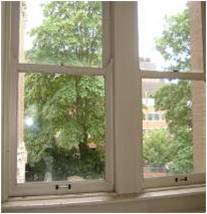Buildings' Water Use
Water use in commercial and institutional facilities, such as office buildings and hospitals, account for 17% of publicly-supplied water use in the U.S.
Source: EPA WaterSense![]()
Related Topics
Guiding Principles for Sustainable Federal Buildings
The Guiding Principles for Sustainable Federal Buildings and Associated Instructions are a set of sustainable principles for integrated design, energy performance, water conservation, indoor environmental quality, materials, and resilience aimed at helping Federal agencies and organizations:
- Reduce the total ownership cost of facilities
- Improve energy efficiency and water conservation
- Provide safe, healthy, and productive built environments
- Promote sustainable environmental stewardship
Guiding Principles for Sustainable Federal Buildings and Associated Instructions
Water Consumption Intensity
Total water consumption per square foot of building space (e.g., kgal/sq-ft)
WaterSense

WaterSense, a partnership program of the U.S. Environmental Protection Agency (EPA), seeks to help consumers make smart water choices that save money and maintain high environmental standards without compromising performance. Independent, third-party licensed certifying bodies certify that products meet EPA criteria for water-efficiency and performance by following testing and certification protocols specific to each product category. Products and services that have earned the WaterSense label have been certified to be at least 20% more efficient without sacrificing performance. WaterSense products are required under FAR 23.103.
Buying WaterSense products? Review clause 52.223-23![]() for applicability.
for applicability.
Visit Program Site: WaterSense![]()

